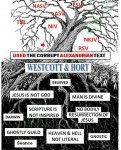In the first printing of the KJV (this is several centuries ago) I hear there were lots of complaints about certain words the scribes added that they thought would "help" the translation, but because they were unfamiliar with that culture (and figures of speech) they made mistakes...so in the next edition they placed any words they added in italics.
So I like the KJV as an English translation because I can clearly see and ignore words not from the originals...you can't do that with most (not all) later English versions. They're not completely incorrect everywhere, but there are more than a few instances where the added words or phrases actually change the original meaning of the text.
As far as I've seen with later English translations (even the NKJV), many (not all) have simply translated the KJV into modern English with all of "extra-biblical" words & phrases kept (this time without any italics), so these errors are now baked in and hidden.
To be honest, all translations are a bit faulty (even some Greek and Hebrew manuscripts), but the further you get away from those manuscripts the worse the translations are (by comparison). Still, reading *a* holy bible is better than reading no bible. Because you're sincere, God will guide you to the truth.
So I like the KJV as an English translation because I can clearly see and ignore words not from the originals...you can't do that with most (not all) later English versions. They're not completely incorrect everywhere, but there are more than a few instances where the added words or phrases actually change the original meaning of the text.
As far as I've seen with later English translations (even the NKJV), many (not all) have simply translated the KJV into modern English with all of "extra-biblical" words & phrases kept (this time without any italics), so these errors are now baked in and hidden.
To be honest, all translations are a bit faulty (even some Greek and Hebrew manuscripts), but the further you get away from those manuscripts the worse the translations are (by comparison). Still, reading *a* holy bible is better than reading no bible. Because you're sincere, God will guide you to the truth.

